
Annual Review 2022
The year of changes and restructuring
“For Lehto, 2022 was a year of changes and restructuring. Among other things, we signed a new financing agreement, sold the pipeline renovation business and made several changes to the organization. Right at the end of the financial year, we sold and agreed sales of balance sheet items to strengthen cash flow.”
“At the beginning of 2022, Lehto was focusing heavily on strengthening its operative functions and implementing measures to improve profitability. During the first half of the year, we focused on stabilising our financial position, and at the end of June we signed a financing agreement that laid the foundation for improved profitability and implementing our revised strategy (which we updated in the spring).”
“During the second half of the year – and especially in the fourth quarter – interest rates rose and the construction market weakened even further. This was reflected in slow housing sales and delays in customers’ investment decisions, as well as general challenges in obtaining financing in the construction sector. At the end of 2022, a significant number of planned investor projects had not been launched due to a lack of funding, and the start of several business premises projects had been postponed for market-related reasons.”
Annual Review 2022
1
Lehto #forebuilder
Lehto Group is a Finnish construction and
real estate group.
Our company is reinventing construction and aims to
improve the productivity of the industry, which has remained flat for a long time. Thereby, we seek to create customer benefits and added value for both our customers and shareholders.
Our mission is to be
a forebuilder of a better tomorrow.
3
Figures
Net sales 2022:
344.8 MEUR
Personnel
664 (end of the year)
Factories:
4 production facilities
2
Products and services
The company has divided its operations
into two service areas: Housing and
Business Premises.
In the Housing service area, we build apartment buildings using wood and concrete. In addition, we are in the care home construction business.
In Business Premises service area builds premises, e.g. for the needs of industry, storage and logistics. In addition, we build hall-like commercial buildings, sports halls and selectively multipurpose buildings.
4
Our competitive edge
Lehto continued to stand out from its
competitors through its utilisation of modularity
and industrial prefabrication. In addition,
the company has its own design office,
which is not typical of ordinary resourcing in the industry. Lehto harnesses them to further develop business operations that enable scalability. These strategic choices open up opportunities to improve profitability in the construction sector and to engage in business that serves the environment.
Our service areas
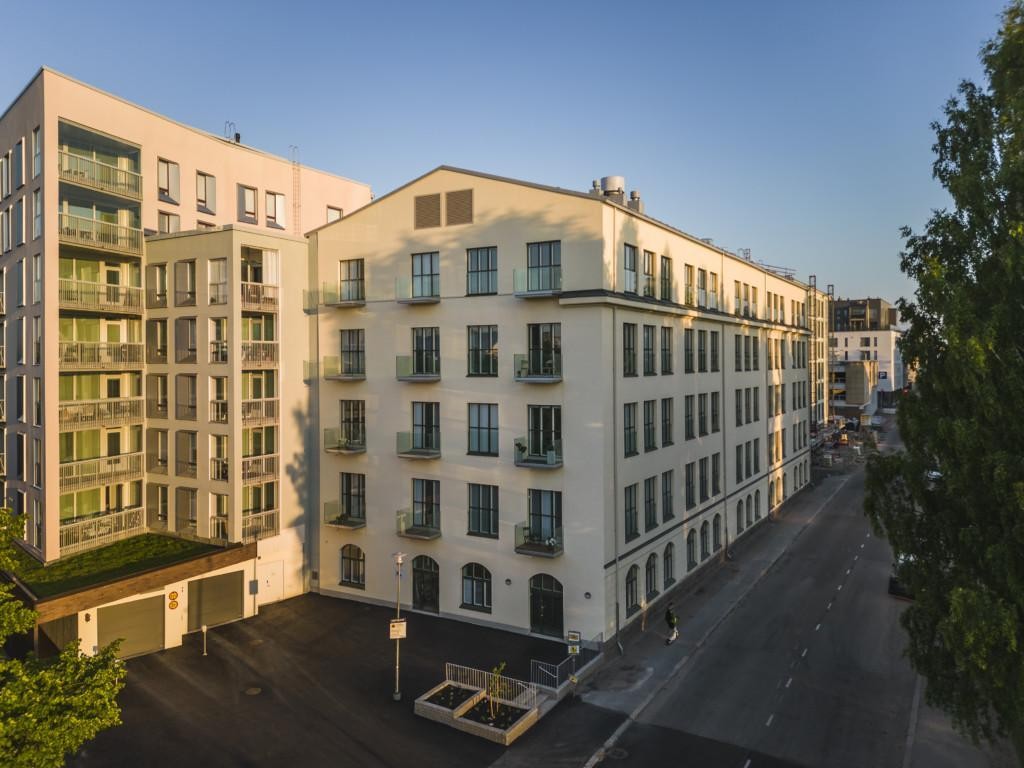
The Housing service area builds apartment buildings using wood and concrete in Finnish growth centres.
In particular, the company seeks to increase the share accounted for by modular and industrially prefabricated wood construction during the strategy period. Before pursuing growth, the wooden apartment building product will be developed further. In addition, the company wants to engage in closer cooperation with cities in town planning and building permit processes. Demand for wooden apartment buildings is seeing strong growth.
In concrete construction, the Housing service area develops its competitiveness by improving cost-effectiveness.
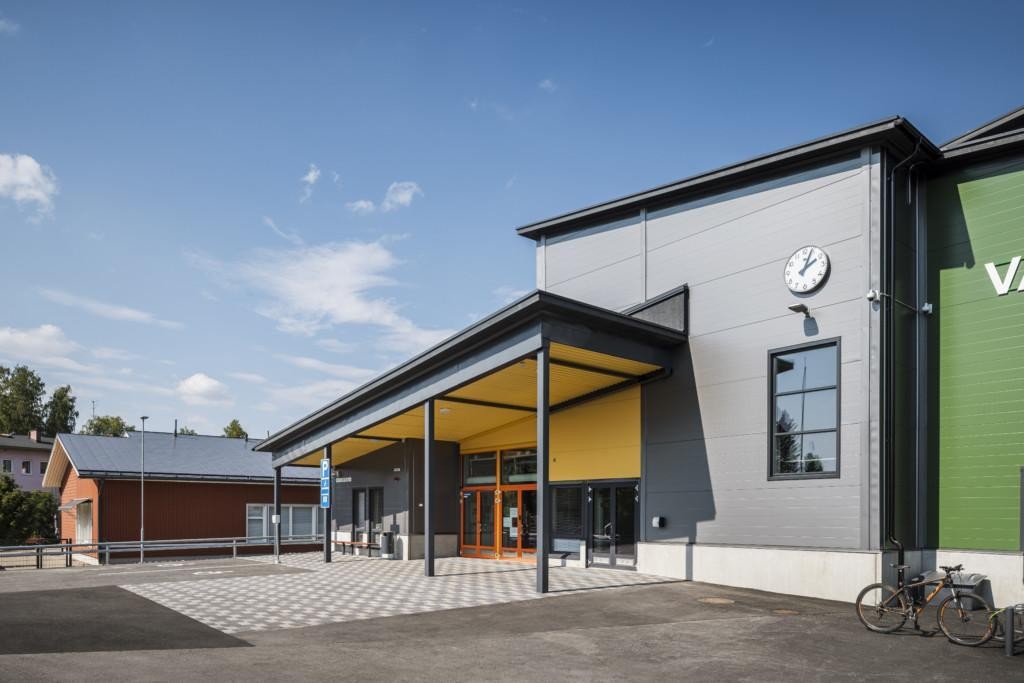
Going forward, the Business Premises service area will build projects to meet the needs of growing market sectors, such as industry, storage and logistics.
In addition, this service area builds hall-type business buildings and selected multifunctional buildings, for which there is expected to be a growing need in the largest growth centres and dense urban structures. Sports halls are also included in the product range.
The Business Premises service area focuses geographically on market areas in the growth triangle (the region between Helsinki, Tampere and Turku) and the Oulu region.
Year 2022 in brief
Net sales, EUR million
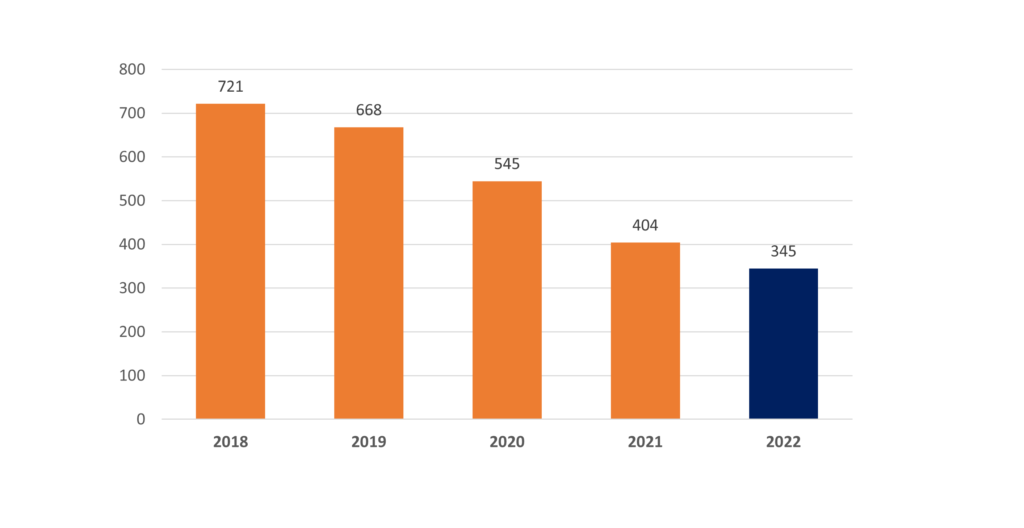
Operating result, EUR million and operating result, %
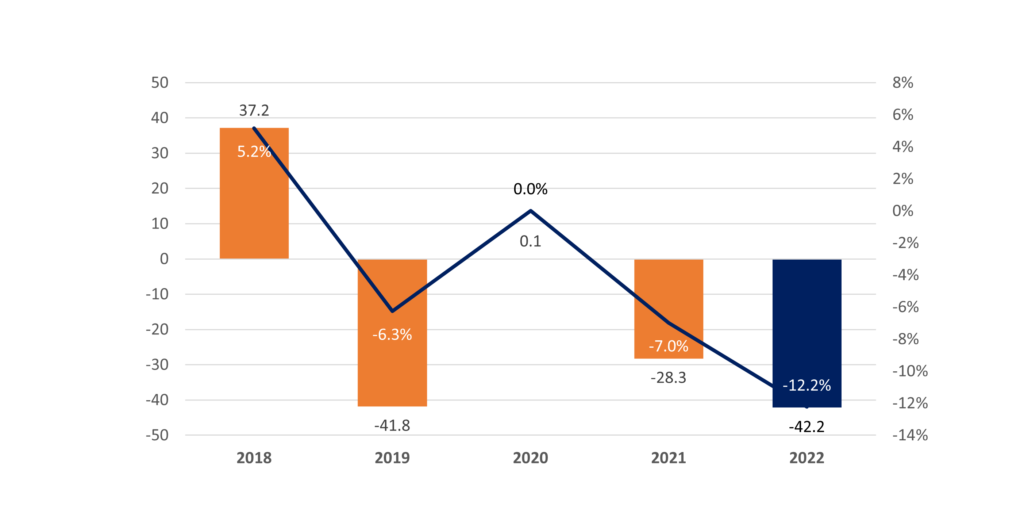
Number of personnel at the end of the year
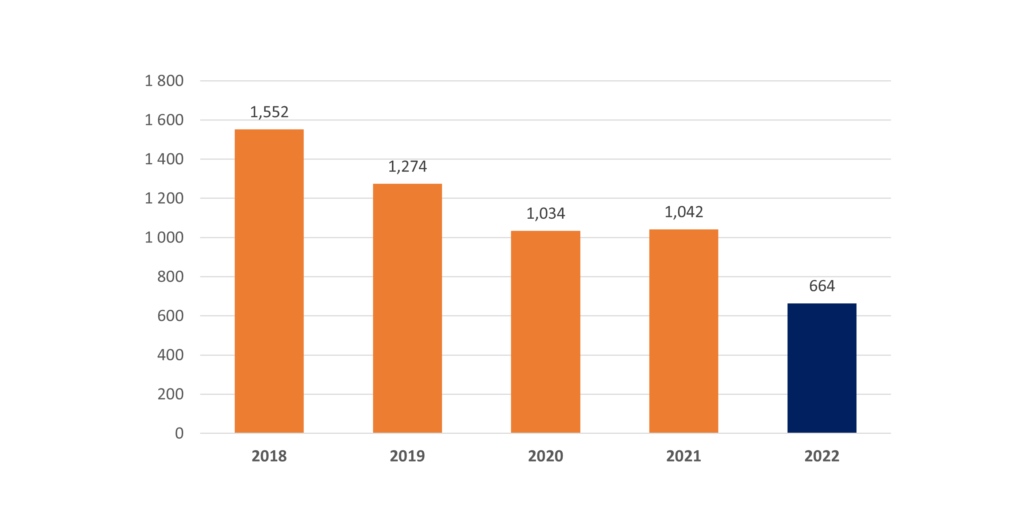
Equity ratio, %
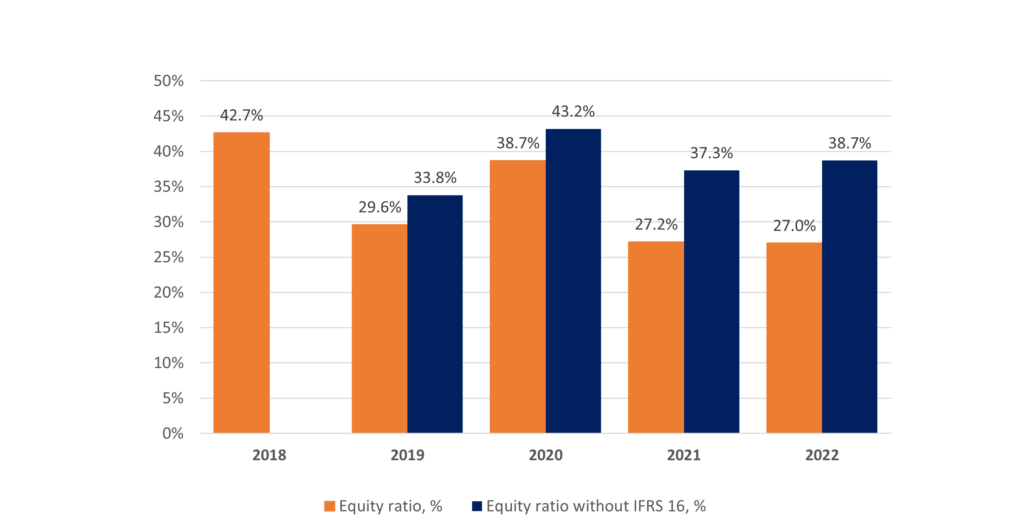
Net gearing ratio, %
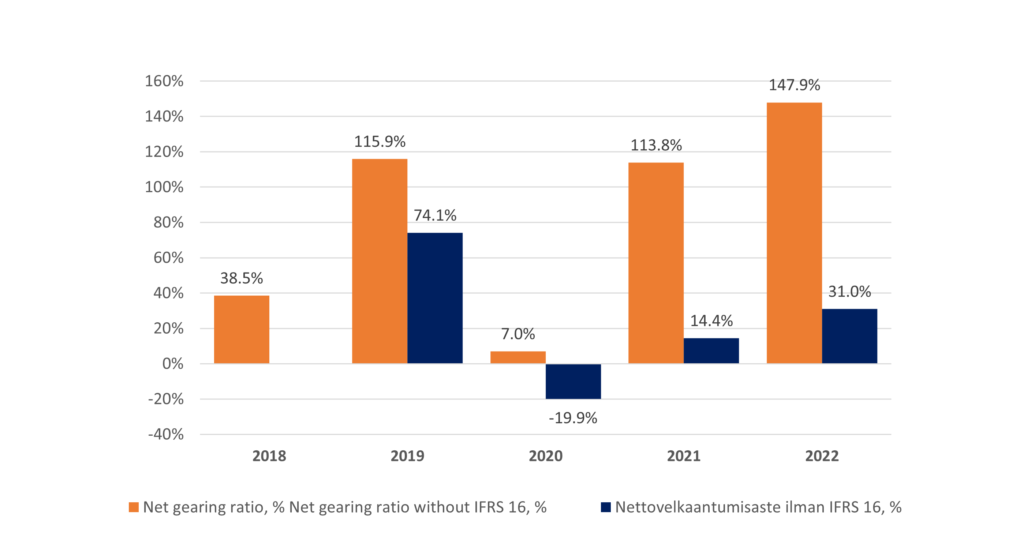
Order backlog, EUR million
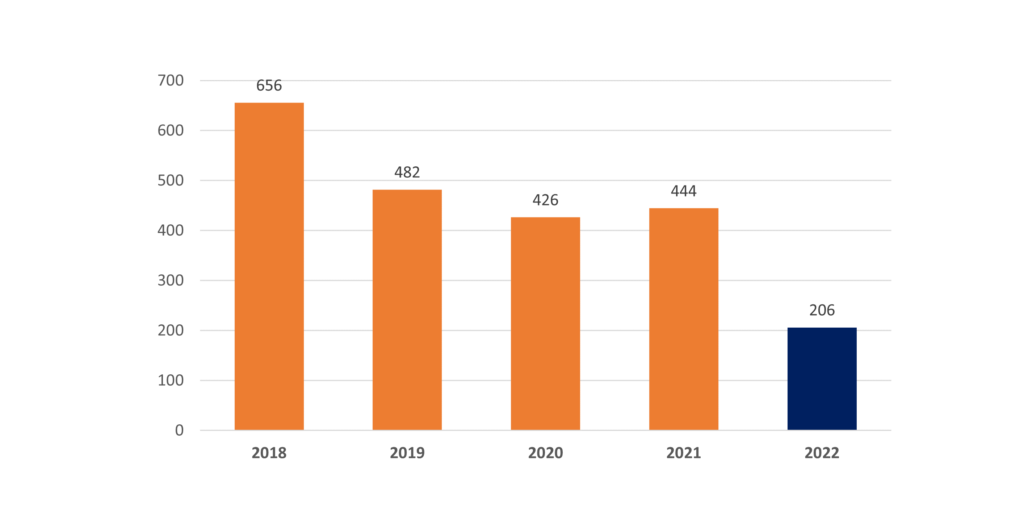
From CEO
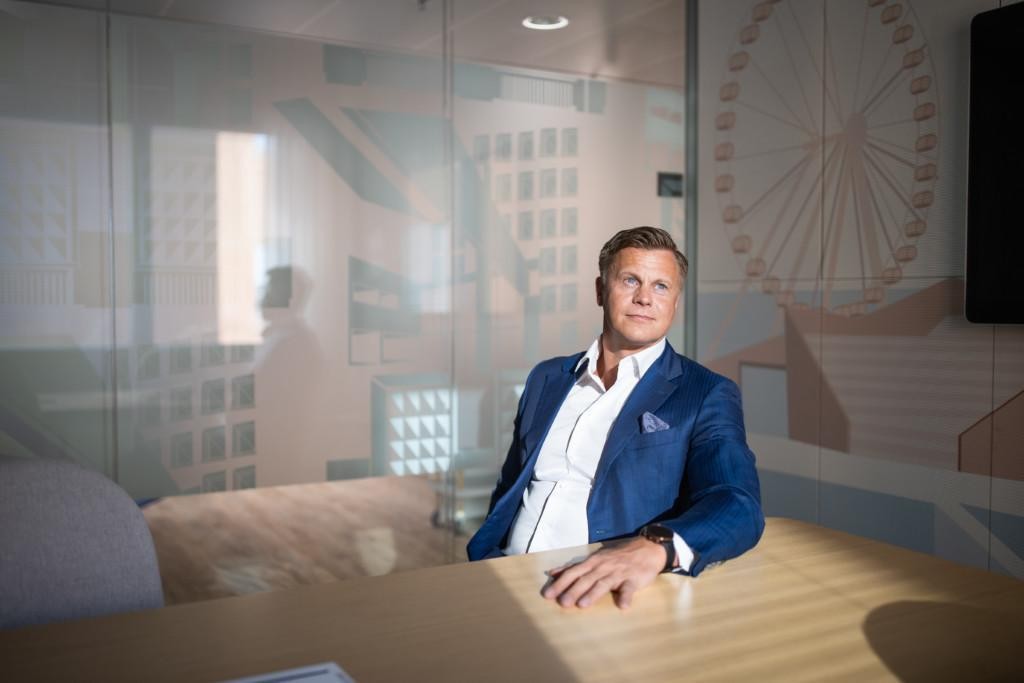
"For Lehto, 2022 was a year of changes and restructuring."
Juuso Hietanen, CEO
“For Lehto, 2022 was a year of changes and restructuring. Among other things, we signed a new financing agreement, sold the pipeline renovation business and made several changes to the organization. Right at the end of the financial year, we sold and agreed sales of balance sheet items to strengthen cash flow.
At the beginning of 2022, Lehto was focusing heavily on strengthening its operative functions and implementing measures to improve profitability. During the first half of the year, we focused on stabilising our financial position, and at the end of June we signed a financing agreement that laid the foundation for improved profitability and implementing our revised strategy (which we updated in the spring).
During the second half of the year – and especially in the fourth quarter – interest rates rose and the construction market weakened even further. This was reflected in slow housing sales and delays in customers’ investment decisions, as well as general challenges in obtaining financing in the construction sector. At the end of 2022, a significant number of planned investor projects had not been launched due to a lack of funding, and the start of several business premises projects had been postponed for market-related reasons.
Our operations generated losses in 2022. The main reasons for this were loss-making construction projects for business premises and wooden apartment buildings. Business Premises had five projects that made significant losses (office, hotel or renovation projects), as their sale prices had been fixed even before the final plans had been drawn up. This proved challenging in 2022, when the prices of building materials rose considerably. An operating and pricing model based on fixed prices has proven to be a poor and loss-making option in the long run. It has, therefore, been changed.
However, the performance of old projects is still being reflected in our financial results. Other business premises projects are progressing in accordance with our new strategy and operating model, and are reaching – or even exceeding – their targets. In our new strategy, Business Premises will focus on hall-like structures, in which we are very competitive and highly proficient.
Although our company has historically built wooden apartment buildings with a good profit margin, this business caused losses in 2022. Its profitability challenges are mainly related to the organisational model, project planning and on-site implementation. Modular wooden housing construction is very different to traditional in-situ concrete construction during the design and production phases, and we didn’t take its requirements into sufficient consideration from plot acquisition to construction. We made corrections a year ago, and now have a highly experienced organisation specialising in wooden apartment buildings. In this business, we have traditionally carried out only developer contracted projects for consumers and investors. To ensure more consistent volumes, we have also decided to start contracting. Demand for wooden apartment buildings appears to be good in the current market – and even better in the future. We also have confidence in the profit-making capacity of our current organisation.
Our concrete housing business is stable and remained profitable in spite of the difficult market situation and the exceptional – and in some cases considerable – price reductions. However, there is still room for improvement in profitability. Although prefabrication and modularity have helped us to be cost-effective, there are still improvements to be made in the efficiency of planning and design. Measures to improve profitability have been successfully implemented in the organisation and the company has also gained a lot of expertise, particularly in the development phase of housing projects, but also in production management. In the current market, we will focus on investors to ensure cash flow and minimise sales risks. As the market improves, we will shift our focus more towards consumers in line with our strategy.
We are now in a challenging market situation. Our goal is to ensure steady cash flow and keep the number of unsold apartments low. In the short term, our cash flow will be supported by the sale of some assets and significant scheduled payments as several projects progress. Steady cash flow will be ensured by the fact that almost 90 per cent of our ongoing housing projects are being built for institutional investors and therefore have no associated sales risks. As the focus of our housing construction has shifted from consumer projects to investor projects, the risks associated with selling housing units have also decreased. We had 73 completed yet unsold units at the turn of the year.
The cost-cutting and efficiency-improving measures that we have implemented will also help to improve profitability. We have implemented a significant number of corrective measures in 2022. We have made structural changes, altered our operating methods, and revised our approach to capital use and strengthening cash flow. Personnel participated in two sets of change negotiations, the results of which have been implemented. We have improved our cost-efficiency by, for example, consolidating our factory production on one factory in Oulainen. We have also agreed to sell another factory property to the City of Oulainen. The company had 664 employees at the end of 2022, which is 36 per cent fewer than a year earlier. Of the reduction in the number of people, 121 people are related to sale of pipeline renovation business.
At the end of January, we announced that the company’s current business portfolio was wide taking into consideration the market circumstances and the company’s financial position, and that we had started a process to seek industrial or ownership partners. It is possible that the company may arrange its businesses either in whole or in part. We will report on our progress as soon as it is time.”
Juuso Hietanen, CEO
From 2022
Q1
- Lehto launches change negotiations to streamline its operations and
to reduce the cost pressure of rising construction costs. - Olli Salo is appointed as the new CEO of Insinööritoimisto Mäkeläinen,a design office owned by Lehto.
Q2
- Lehto announces that the company is planning for an approximately EUR 15 million
equity-linked financing arrangement. - Lehto sells its pipeline renovation business.
- Lehto publishes the updated strategy and financial objectives for the year 2022 – 2026.
- Lehto announces that Lehto and banks have agreed on financing as part of
approximately EUR 50 million financing package. Lehto’s new financing agreement entered into force.
- Jani Pentti appointed Lehto’s Vice President, Human Resources
- The sale of Lehto’s pipeline renovation business is completed
Q3
Lehto announces the news about a new care facility in Oulu’s city centrum, which is implemented as a collaboration between three actors. The site will be built and owned by Hoivatilat Oyj, the main contractor will be Lehto Group Oyj, and housing solutions with versatile services will be provided by Nonna Group Oy.
Q4
- Lehto and eQ announce that they have agreed on the construction of two apartment buildings in the Helsinki metropol area.
- TA-Yhtymä Oy and Lehto agree on the sale of an apartment building in Espoo’s Nihtsilta.
Lehto becomes a member of the Confederation of Finnish Construction Industries RT
- Lehto announces that it is preparing for the weakening market prospects of the construction industry by initiating adaptation measures, with which the company aims for a total of approximately 6-7 million euros in cost savings for 2023. As part of the measures, the company will start change negotiations.
- Lehto’s change negotiations are completed. The company carries out the terminations and layoffs of employment equivalent to approximately 90 man-years of work.
- The board of Directors appoints Eero Sihvonen as new chairman from among its members.
In 2022 we updated Lehto's strategy
In April 2022, Lehto published its updated strategy for the years 2022 – 2026. The company will focus on operational business and improving profitability in the early part of the strategy period
Lehto will develop its modular wooden apartment building and then seeks to increase the volume accounted for by wooden apartment buildings during the strategy period. One of the prerequisites for growth is to engage in closer cooperation with cities in town planning and building permit processes. Demand is seeing strong growth.
Lehto will enhance its competitiveness by improving cost-effectiveness: efficiency in town planning and design, modularity, industrial prefabrication and an efficient operating model.
Business premises operations are strongly focused on areas where Lehto is competitive. In the short term, Business Premises will focus on improving profitability, which is expected to decrease business volume.
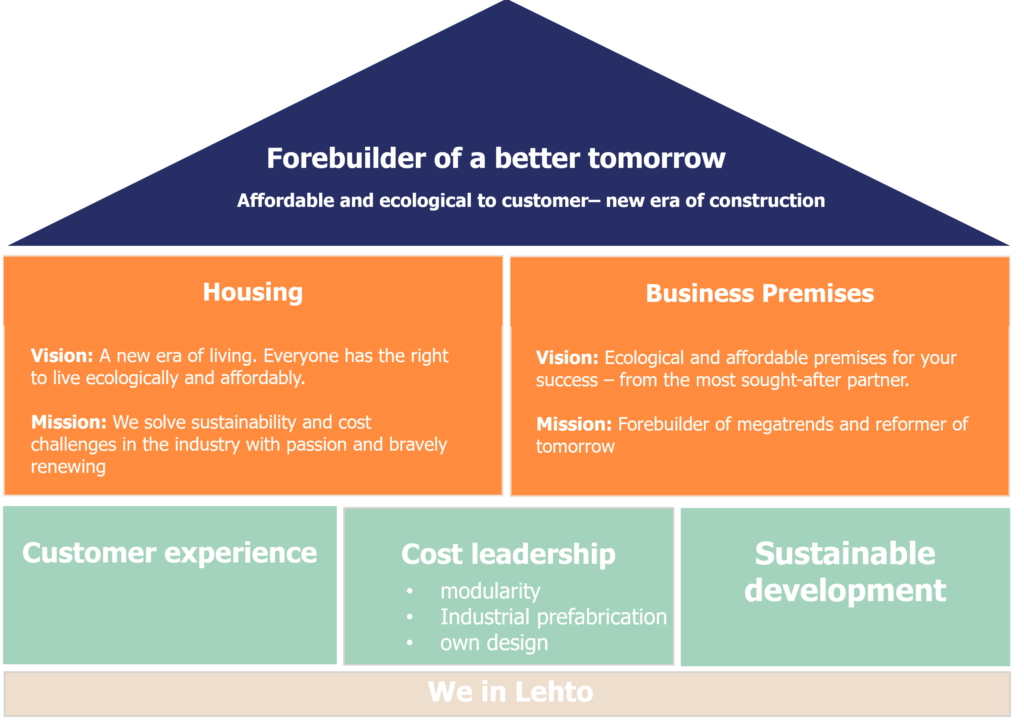
Three important perspectives of strategy
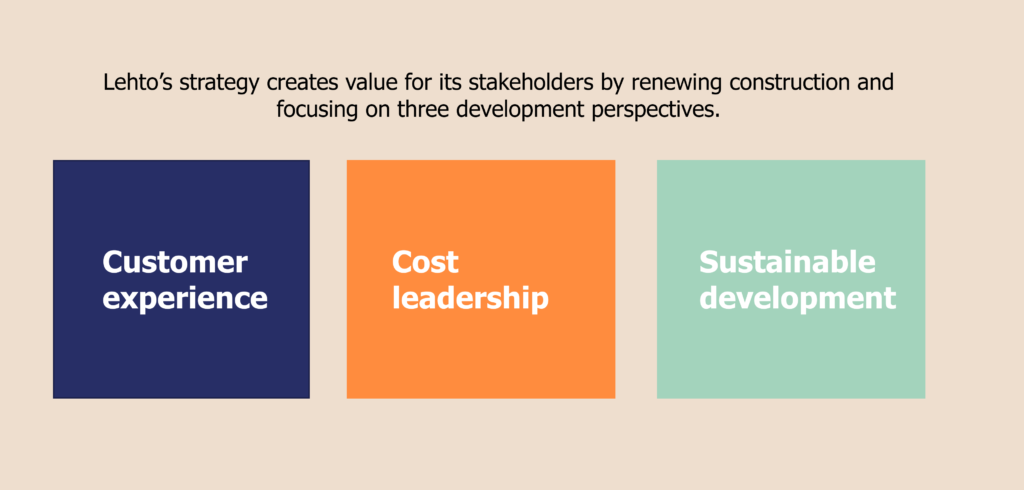
References 2022
Customer survey 2022: Location is no longer the main criterion when buying an apartment
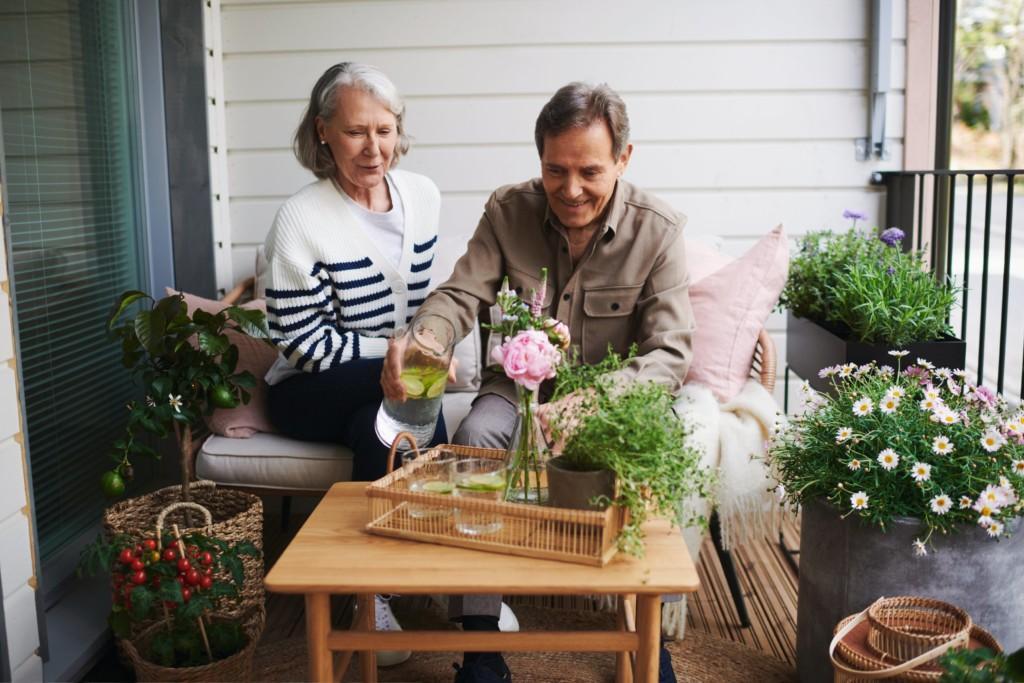
Lehto’s customer survey reveals that location is no longer the main criterion when buying an apartment. Low housing costs now rank highest.
Low housing costs were chosen as the most important criterion by 9.2 per cent of respondents, while only 8.4 per cent of respondents chose location. Housing costs can include things such as the housing company’s maintenance charges, energy consumption, insurance, waste management costs, and renovations.
Finns spend relatively large sums on housing compared to other Europeans. Lehto estimates that buyers of new builds in the Helsinki Metropolitan Area will spend as much as 40–60 per cent of their net income on housing. In Berlin, for example, the corresponding figure is about 20–40 per cent.
“As builders, we must work hard to curb not only construction costs but also housing costs. Just think of the impact on families’ financial positions if we could spend 20 per cent more of our net income on something other than housing. It would also have a very positive impact on society, and especially in times such as these, when our purchasing power is being tested by things such as spiralling inflation, the knock-on effects of the pandemic era and the uncertainty arising from the war in Ukraine,” says Juuso Hietanen, Lehto’s CEO.
Lehto’s customer survey was carried out in spring 2022. It was a quantitative questionnaire survey of 1,474 respondents in the target group.
The survey was conducted as part of Lehto’s strategy work and customer experience development.
Construction megatrends
We have identified three important construction megatrends of the future that Lehto’s approach supports well: industrial manufacturing, digitalisation and ecology.
Industrial manufacturing
In the future, more phases of construction work will no longer be done on site, but at factories. Lehto is a Finnish pioneer in industrial prefabrication. We have the largest domestic factory capacity of our own. Carrying out construction work at factories enhances efficiency and also ensures a moisture-controlled production chain. One of the advantages of mass production is continuous quality improvement. However, mass production does not mean that our customers are unable to make choices that are important to them, such as in terms of interior design.
Digitalisation
Digitalisating construction operations are part of our day-to-day operating model . These days, all projects are started up using information models. Lehto uses information models throughout the construction process, from design to construction. Thanks to this, those working in different roles can utilise real-time information during the entire project.
Ecology
Lehto is interested in sustainable carbon-neutral construction and seeks to gradually move towards the carbon-neutral circular economy. Ecological construction currently revolves around Lehto’s wooden apartment building concept, in which the primary raw material is Finnish wood. The concept utilises industrial manufacturing, which supports the ideology of sustainable construction by reducing waste and loss. In addition, many projects company-wide make use of geothermal heat and other energy-efficiency solutions.
Industrial manufacturing
Lehto is also changing construction with the power of its industrial prefabricated production, and building using factory products is one of the cornerstones of Lehto’s operating model. We are transferring challenging phases of construction from sites to factories – indoors, where work is not at the mercy of the weather. Industrial prefabrication enables us to achieve cost and time benefits as well as to ensure quality from start to finish with our sustainable moisture-controlled chain.
Lehto manufactures a variety of building modules and elements at its own production facilities. Lehto has production facilities in Oulainen, Hartola, Siikajoki and Ii, totalling about 50,000 m2.
The products manufactured for use in housing and business premises are: load-bearing large roof elements, combined kitchen and bathroom modules, bathroom modules, apartment elements, windows, and riser elements for pipeline renovations. Although Lehto primarily manufactures modules and elements in its factories for its own use, the company does engage in some external sales in this area.
The most extensively productised industrially manufactured product is Lehto’s wooden apartment building – the flats are made at the factory. The space elements, including their decor, are finished at the factory, after which they are installed on site.
Oulainen
- Fixtures: kitchens, bedroom closets, hallway closets, kitchen islands, bathroom fixtures
- Windows and balcony doors
- Technical Studios for apartment buildings,
kitchen-bathroom modules for care homes - Concrete slabs for Technical Studios
- Plumbing elements
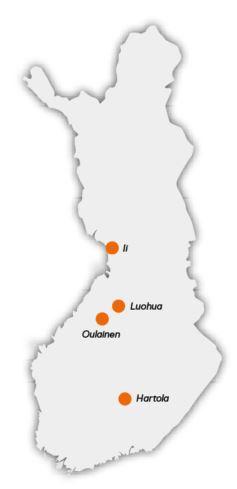
Hartola
- Space elements for
modular apartment
buildings - Space elements for
daycare centres - Space elements for schools
- Large roof elements
Luohua, Siikajoki
- Wooden wall elements
- Partition walls
- Wooden detachable elements
Ii
- Wooden wall elements
- Partition walls
- Wooden detachable
elements
Lehto’s factory products
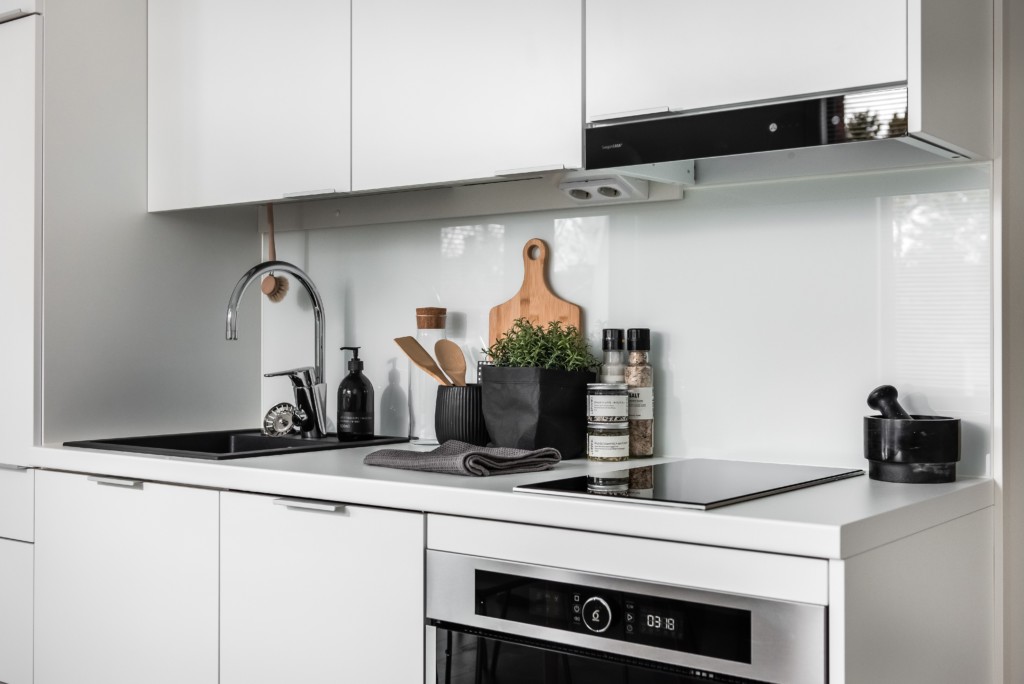
Kitchen and bathroom modules
Kitchen and bathroom modules are mainly used in the construction of apartment buildings and care homes. The modules are manufactured under stringent quality control that ensures not only even quality, but also considerably better moisture control than in traditional construction. The use of modules also facilitates scheduling the construction site phase, which speeds up the completion of the properties and enables significant cost savings. The completed factory-made modules are lowered into the interior through the roof.
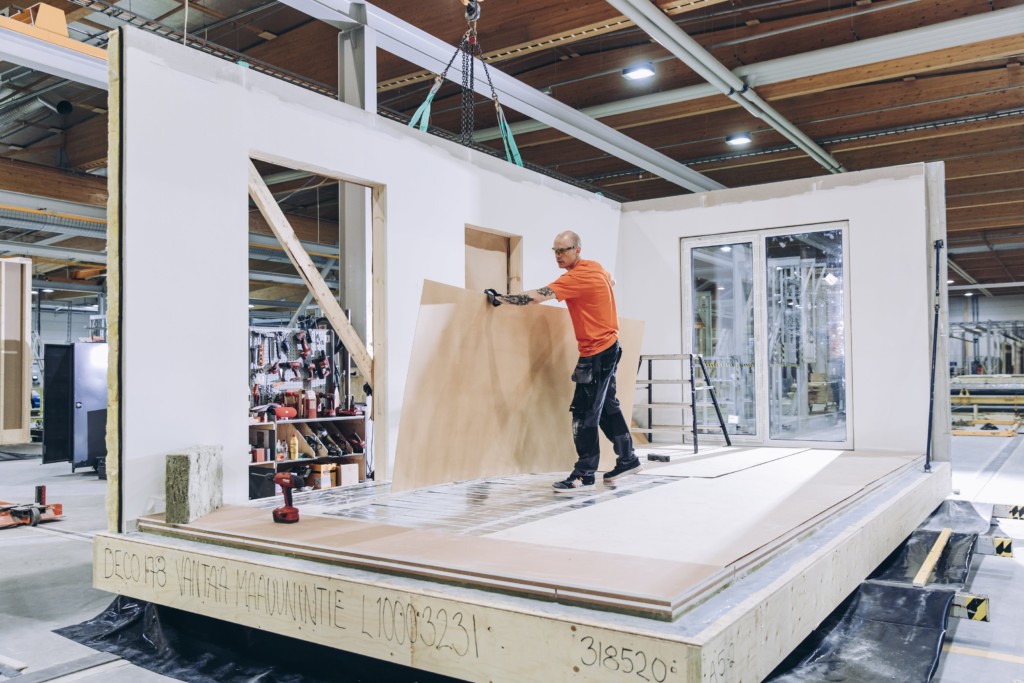
Apartment elements
Lehto’s apartment elements are completely finished apartments manufactured on the assembly line. The completed apartments are installed on the construction site on top of prebuilt foundations. This improves the quality of construction, ensures a moisture-controlled process and reduces the construction time on site by almost a half compared to traditional construction. Apartment elements can be used to build 2–4 storey small apartment buildings. Apartment elements are produced at the Hartola factory.
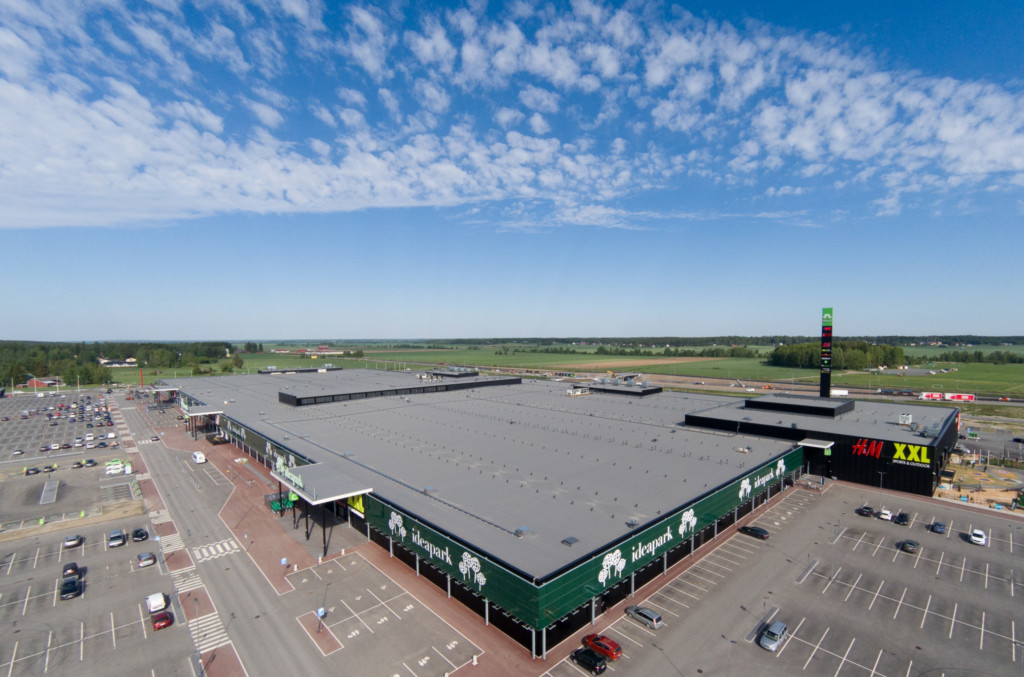
Large roof elements
Lehto’s large roof elements are manufactured at our Hartola factory. By using finished elements, we can install up to 1 500 m² of roof a day. Lehto’s large roof elements come equipped with lines for sprinkler systems, electricity wiring and installation rails, for example, according to the customer’s wishes.
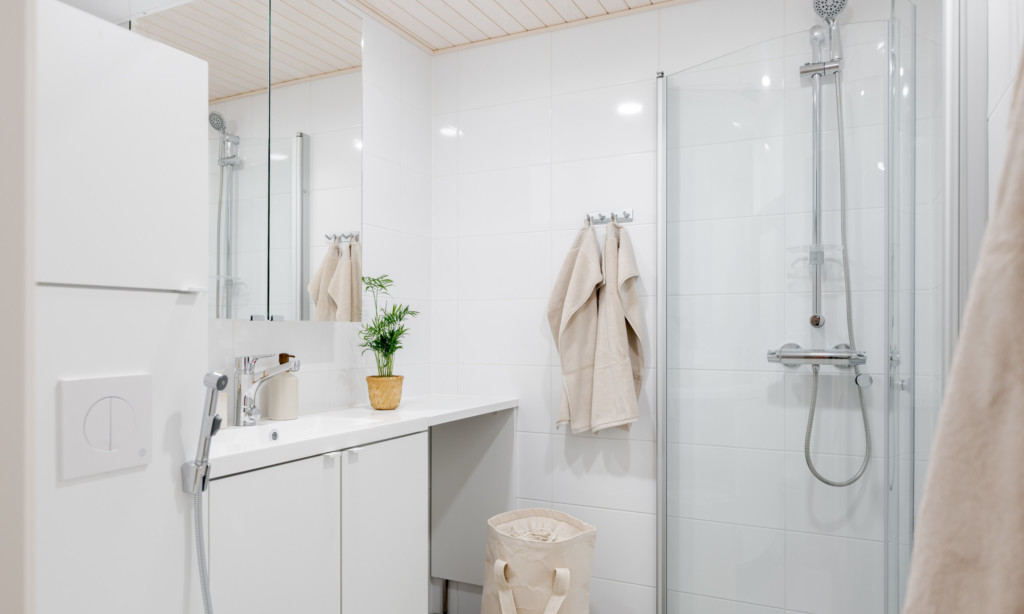
Riser elements
The riser elements developed by Lehto considerably speed up the implementation of plumbing renovations and bring savings on overall costs to housing companies. Our stylish riser elements are manufactured at our factories under carefully monitored conditions. The use of riser elements reduces the space needed for new pipelines and ensures both uniform quality and top-class leakage security. It also considerably reduces the logistic challenges of the renovation. The riser elements contain a wide range of prefabricated technology, such as heating, water, drain and electricity rises. A modern, easy-to-clean wall-hung toilet is also integrated into the element. In large pipeline renovation projects, the riser elements can be customised.
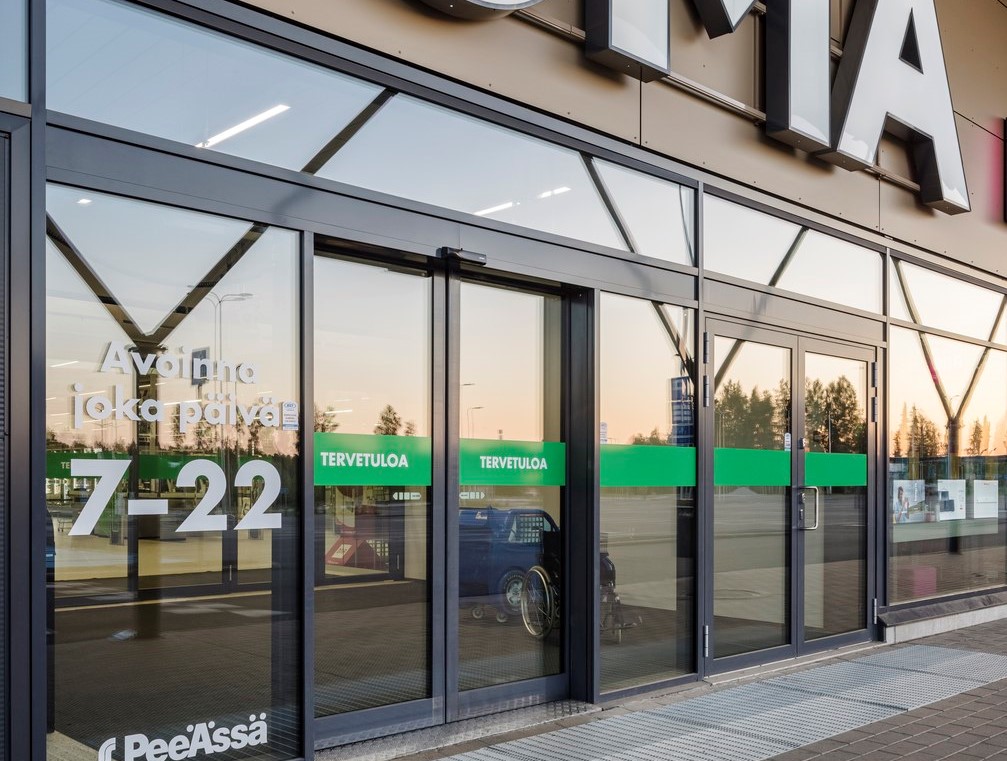
Windows and doors
High-quality aluminum windows and balcony window doors are made from Schuco profiles. Composite windows and balcony window doors are made from REHAU profiles. Certified fire windows and doors create safety for the building.
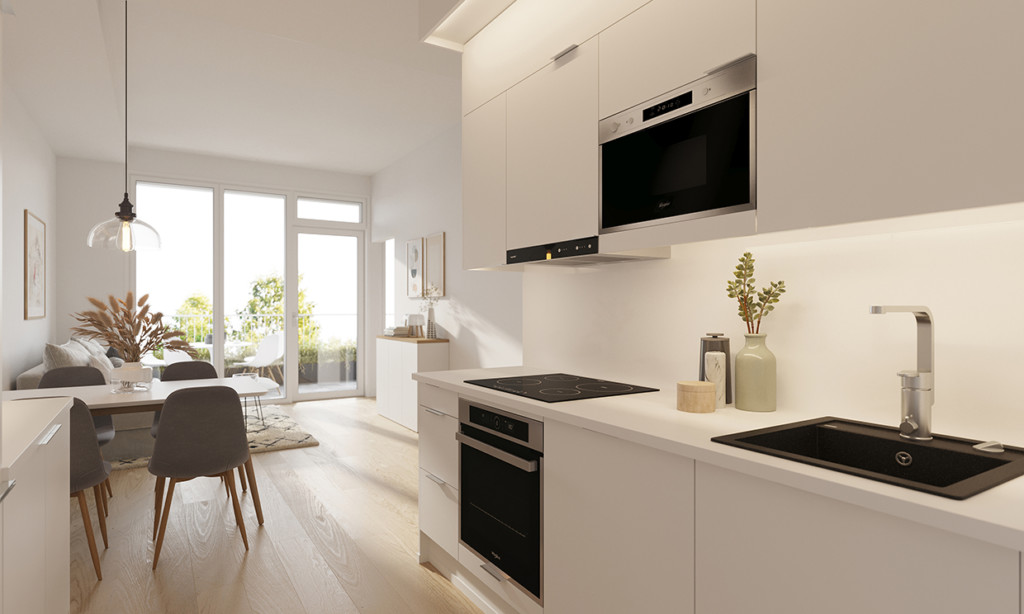
Fixtures
We manufacture kitchens, bedroom and hallway closets, kitchen islands, and bathroom fixtures, for instance.
Our employees
Lehto had an average of 860 employees in 2022. The number of personnel fell by 183, mainly due to changes in the business environment and the sale of Remonttipartio Oy (that is, the pipe renovation business). Total personnel turnover was 26.1 per cent (2021: 23.6%). There were 664 active employment contracts at the end of the year, of which 541 (81.5%) were held by men and 123 (18.5%) by women. The proportion of all employees accounted for by blue collar workers decreased slightly (278/41.9%) in relation to the number of white collar employees (386/58.1%). 650 employees (97.9%) had permanent employment contracts. Those with fixed-term employment contracts (14/2.1%) were mainly student trainees, substitutes, and those engaged in project work or other agreed-upon temporary tasks. 34 students participated in our Career Promise programme during 2022.
Personnel development continued during the year, and particularly in terms of project management and associated legal expertise. We also arranged training in areas such as customer service.
The Pulse survey that was sent to all Lehto personnel in the autumn indicated that motivation was at a good level. We also received a lot of feedback from employees who thought that internal cooperation had improved within the Group.
The largest personnel event of the year was Lehto Day, which was carried out completely online for the first time. Our Lehto Employees of the Year, who were voted for by personnel, were given their awards during the event.
Determined action to further enhance the Group’s occupational safety continued in 2022. We succeeded in keeping the accident frequency rate at the same level as in 2021, and it stood at 15 in 2022 (2019: 29, 2020:22, 2021:15).
When it comes to wellbeing at work, we take an early intervention approach, provide personnel with support, and address any issues that may cause mental and physical stress. The pandemic situation eased considerably on the previous two years. A hybrid work model, in which employees working in the office did more work remotely, has proved to be an effective means of improving wellbeing at work. Sickness absences at Lehto remained at a low level compared to the general level of the industry at 3.5% (2.8%).
Group Management
Juuso Hietanen,born 1977, has been the Company’s CEO from May 2021. Hietanen was Bonava Finland’s CEO prior to joining the Company. Prior to that, he held management positions in housing production at NCC since 2004 in Finland, Russia, and the Baltic countries. Juuso Hietanen holds the degree of M.Sc. (Eng.).
Veli-Pekka Paloranta, born 1972, has been the Chief Financial Officer in Lehto since November 2015. In 2000– 2015, he has worked in the JOT Automation and Elektrobit groups. During 2010-2015 he was the CFO of Bittium Plc (former Elektrobit Plc) and since 2020 he has acted as the Member of the Board of Directors and the Member of the Audit Committee in Bittium Plc. Paloranta holds the degree of M. of Sc. (Econ.).
Tero Karislahti, s.1983, has acted as EVP Housing since June 2022. Karislahti has 18 years of work experience in various positions at the construction group YIT. Since 2015, Karislahti has worked in management positions in housing construction, including as regional director. Karislahti holds the degree of M.Sc. (Eng.).
Matti Koskela, s.1966, has acted as EVP, Business Premises since beginning of year 2022. Since 1994, he has worked as a foreman and responsible foreman and as a work manager in construction site production. Since 2001, he has worked in the management positions of residential and office construction and renovation construction as unit manager, business group manager and division manager for a construction company YIT. Koskela holds the degree of Civil engineer.
Timo Reiniluoto, born 1966, served from November 2014 to May 2017 as CEO of Lehto’s subsidiary Rakennusliike Lehto Oy. From the beginning of March 2017, he has acted as EVP, Business Support Services at Lehto Group. He has 30 years’ experience in various tasks in the construction sector, including as EVP and Head of Commercial Construction Southern Finland at Skanska. He also has ten years’ work experience in Russia. In addition, Reiniluoto served as Board member of Oy Lautex Ab in 2006–2013. Reiniluoto holds the degrees of M.Sc. (Eng.) and Hanken MBA (Real Estate Finance).
Vice President, Human Resources
b. 1974, Finnish Citizen
Jani Pentti, born 1974 has served as Vice President, Human resources since summer 2022 and past 3 years as a human resources manager. He has about 15 years of human resource management experience in the construction industry, including the construction company Lemminkäinen and Lehto. Pentti holds the bachelor’s degree of Community Educator.
Jukka Haapalainen, born 1975, has been employed by Lehto since 2019. He has over 20 years of experience in versatile and demanding industrial development and management roles. Most recently he has worked for Nestor Cables Oy and Eastman Chemical Company. Haapalainen holds the degree of M.Sc. (Eng.).
Shares and shareholders
| SHARE HOLDERS 31 December 2022 | Number of shares | % |
| Lehto Invest Oy | 33 914 760 | 38.83% |
| Kinnunen Mikko | 1 326 454 | 1.52% |
| Mevita Invest Oy | 1 286 867 | 1.47% |
| Nordea Henkivakuutus Suomi Oy | 1 026 200 | 1.18% |
| Saartoala Ari | 1 011 839 | 1.16% |
| OP-Henkivakuutus Oy | 742 793 | 0.85% |
| J & K Hämäläinen Oy | 700 000 | 0.80% |
| Lindsay von Julin & Co Ab | 700 000 | 0.80% |
| Tuuli Markku | 579 000 | 0.66% |
| Paloranta Veli-Pekka | 501 653 | 0.57% |
| 10 LARGEST SHAREHOLDERS | 41 789 566 | 47.85% |
| Nominee-registered | 1 166 362 | 1.34% |
| Other shareholders | 44 383 482 | 1 |
| TOTAL | 87 339 410 | 100.00 % |
SHARE DISTRIBUTION
| Number of shares | Shareholders | % | Shares | % |
| 1 – 100 | 4,160 | 24.64 | 193,138 | 0.22 |
| 101 – 1,000 | 7,571 | 44.85 | 3,259,391 | 3.73 |
| 1,001 – 10,000 | 4,370 | 25.89 | 14,567,280 | 16.68 |
| 10,001 – 100,000 | 728 | 4.31 | 19,564,129 | 22.40 |
| 100,001 – 1,000,000 | 47 | 0.28 | 11,189,352 | 12.81 |
| > 1,000,000 | 5 | 0.03 | 38,566,120 | 44.16 |
| Total | 16,881 | 100.00 | 87,339,410 | 100.00 |
| Nominee registered | 9 | 0.05 | 1,166,362 | 1.34 |
| In special accounts | 0.00 | 0 | 0.00 | |
| Number of shares issued | 0.00 | 87,339,410 | 100.00 |
SECTOR
| Sector | Shareholders | Shares and votes | ||
| Number | % | Number | % | |
| Private companies | 622 | 3.68 | 43,151,028 | 49.41 |
| Financial and insurance institutions | 12 | 0.07 | 2,687,343 | 3.08 |
| Public sector organizations | 2 | 0.01 | 27,410 | 0.03 |
| Households | 16,183 | 95.87 | 40,562,833 | 46.44 |
| Non-profit instit serving households | 17 | 0.10 | 63,080 | 0.07 |
| Foreigners | 36 | 0.21 | 847,716 | 0.97 |
| Total | 16,881 | 100.00 | 87,339, 410 | 100.00 |
| Nominee registered | 9 | 0.05 | 1,166,362 | 1.34 |
| Total number on waiting list | 0 | 0 | 0 | 0 |
| In the joint book-entry account | 0 | 0 | 0 | 0 |
| Number of share issued | 0 | 0 | 87,339,410 | 100.00 |

Lehto is a forerunner of a better tomorrow. We are driven by the need to be ahead of our time and reinvent the construction industry – and in this way to generate value, a better tomorrow for our customers: high-quality, affordably-priced, fast and ecological construction. We create ingenious homes, successful business premises, functional care homes and schools.